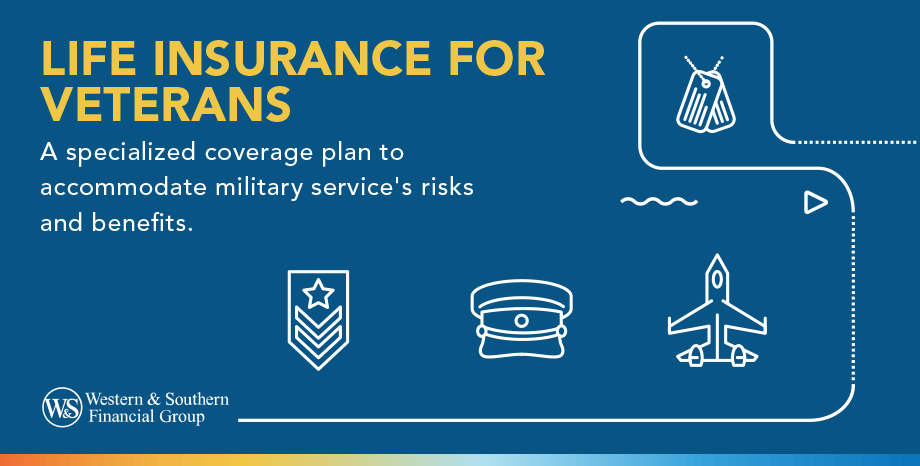

Key Takeaways
- Veterans often need specialized life insurance because service-related health conditions, changing family needs, and the loss of SGLI can affect their coverage options.
- Converting SGLI to VGLI within 240 days helps veterans keep coverage without going through medical underwriting.
- VA programs like VALife and VMLI offer coverage options tailored to veterans with disabilities or mortgage needs.
- Private life insurance can offer higher coverage amounts and more customization but may require full medical underwriting.
- Reviewing your health, budget, and family responsibilities can help you choose a policy that supports your transition to civilian life.
Life after military service comes with new financial responsibilities and new questions about protection. Life insurance for veterans plays a vital role in helping families stay secure, especially when benefits from the military end. Understanding your options can help you choose a policy that honors your service and fits your civilian life.
Why Veterans Need Specialized Life Insurance
Some insurance needs apply to everyone, but others are shaped by military service: deployments, training injuries, exposures, and unpredictable conditions. After transitioning to civilian life, veterans may face these common challenges:
- Post-service health concerns: Issues such as back injuries, hearing loss, and PTSD can influence medical underwriting. Shifts in benefits and the risks of civilian jobs may also affect eligibility and coverage.
- Service-connected disabilities: A VA disability rating can change eligibility for certain plans and may provide access to additional VA programs.
- Changes in family structure: Many veterans leave the military with growing families or new dependents, including aging parents or relatives who need care.
- Loss of SGLI: Servicemembers' Group Life Insurance coverage terminates at discharge, prompting veterans to secure another life insurance option quickly to help maintain financial protection.
- Budget changes: Transitioning to civilian life often comes with a shift in income compared to military earnings. Choosing life insurance with affordable premiums can help support ongoing financial stability.
One of the biggest challenges? The tight conversion window. Veterans have 240 days to convert SGLI into Veterans’ Group Life Insurance (VGLI) with no medical underwriting.1 If you miss that window, and approval becomes harder, especially with serious health issues. Veterans benefit most from life insurance policies designed to meet their specific needs.
Life Insurance Options for Veterans
Let’s break down every major option - government-backed, private-market alternatives, and specialty policies that help fill the gaps.
VA Life Insurance Options
Servicemembers’ Group Life Insurance (SGLI): Active-duty service members and reservists are automatically enrolled in Servicemembers’ Group Life Insurance (SGLI). It offers low-cost term coverage while they are serving. Coverage typically ends 120 days after separation from the military.2
Veterans’ Group Life Insurance (VGLI): It gives veterans the option to convert their Servicemembers’ Group Life Insurance (SGLI) into renewable term coverage after leaving military service.1 Here are some benefits to consider:
- Enrollment window: Apply within 240 days of discharge to avoid medical underwriting.
- Coverage amount: Up to the same amount as SGLI, often capped at $500,000.
- Premium rate: Based on age, not health status.
Veterans Affairs Life Insurance (VALife): The Department of Veterans Affairs offers Veterans Affairs Life Insurance (VALife), which provides whole life insurance coverage designed for veterans with service-connected disabilities.3 Some of its features include:
- No medical exam required
- Coverage up to $40,000
- Cash value accumulation begins after two years
- The full death benefit begins after two years of continuous premium payments
Veterans Mortgage Life Insurance (VMLI): This type of life insurance helps protect families from the burden of a remaining mortgage. If a veteran with a service-connected disability passes away, it pays off the outstanding balance on their VA loan. Unlike traditional life insurance policies, VMLI is tied directly to the mortgage amount, helping the family keep their home without added financial strain.
Private Life Insurance for Veterans
Private insurance companies often provide more flexibility than VA programs. Veterans can choose between:
- Term life insurance: Covers a set number of years at typically lower costs.
- Whole life insurance: Offers lifelong protection with a potential cash value component.
- Mortgage life insurance: Specifically designed to cover mortgage payments after death.
Most term life insurance policies from major providers include a conversion option, allowing policyholders to switch without undergoing further medical underwriting.5 This can be an attractive feature for veterans who might face obstacles in traditional underwriting due to service-related health issues.
Private insurers might offer higher coverage or special riders for disabled vets, but medical underwriting, especially for service-related conditions, may apply.
Guaranteed Issue & Simplified Issue Options
These options may help veterans who have serious health conditions or missed the Veterans' Group Life Insurance (VGLI) enrollment window:
| Feature | Guaranteed Issue Life Insurance | Simplified Issue Life Insurance |
|---|---|---|
| Medical Requirements | No medical exam or health questions | Shorter application with only a few basic health questions |
| Coverage Amounts | Coverage amounts are usually smaller | Premiums are typically higher than traditional policies |
| Common Uses / Access to Coverage | Often used to help cover final expenses like funeral costs and other end-of-life needs | Provides faster, less complex access to coverage |
Other Options
- Group life insurance through employers: Often a budget-friendly option for short-term coverage needs.
- Fraternal or association-based coverage: Groups such as the Military Benefit Association offer policies that may include added benefits and support beyond standard coverage.
Riders & Policy Features Veterans Should Consider
Adding key riders - such as critical illness and accelerated benefit options from veteran-friendly insurers - can turn a basic policy into tailored support for chronic health issues, severe injuries, or long-term needs.
| Rider | Description | Why It Matters for Veterans |
|---|---|---|
| Critical Illness | Provides a lump sum for serious illness diagnosis | Helps cover medical costs not covered by VA benefits |
| Chronic Illness | Offers support if you can't perform daily tasks | Supports long-term care or home assistance |
| Terminal Illness (Accelerated Death Benefit) | Allows early access to the death benefit if terminally ill | May help provide reassurance during final months |
| Disability Waiver of Premium | Pauses premiums during total disability | Prevents lapse during recovery or civilian life transition |
| Accidental Death | Adds extra payout for accidental deaths | Ideal for veterans in high-risk jobs after service |
How to Choose the Right Policy After Service
Selecting the right policy goes beyond choosing what’s most popular; it’s about aligning your coverage with your personal situation, financial limits, and health needs.
- Evaluate Your Family's Needs:
- Identify who relies on your income.
- Review mortgage obligations and other debts.
- Set clear goals for replacing your income if you pass away.
- Compare Coverages:
- VA insurance options are often more affordable and come with fewer health-related barriers, making them accessible to a wider range of veterans.
- Private life insurance typically offers higher coverage limits and more customization, allowing veterans to tailor policies to their individual needs.
- Take Medical Conditions Into Account: Consider service-connected disabilities, medications, and overall health. These factors can influence eligibility and premium costs.
- Consider the Differences Between Term and Whole Life Insurance:
- Term life insurance: Works well for temporary needs, such as mortgage protection or supporting your family during child-raising years.
- Whole life insurance: Offers lifelong protection and may build cash value over time.
- Consider Riders: Riders can help customize a policy for veterans with specific health needs, addressing coverage gaps and offering added flexibility for unexpected circumstances.
- Decide on Budget: Choose coverage you can maintain long-term. A practical budget helps you stay insured and support your family’s financial future.
- Talk to a Financial Representative: A financial advisor can help you compare VA benefits and private plans and select coverage suited to your service history, health, and budget.
- Revisit Your Coverage as Your Needs Change: As life evolves after service, review and update your insurance to stay aligned with your goals and any new benefit options. It’s helpful to reassess every few years or after major life events.
Common Concerns Veterans Have About Life Insurance
It’s completely normal for veterans to have questions about their eligibility, policy pricing, and the level of coverage available, especially if they have service-connected disabilities or other health concerns. Here are several typical questions veterans might have regarding life insurance:
Can I get coverage with a service-related disability? Yes. Programs like VALife and VGLI accept veterans with service-connected disabilities. Some private insurers also consider applicants with higher disability ratings, though premiums may vary.
Are premiums higher for veterans? Not always. VA-backed plans often keep costs competitive. Private insurers, however, base rates on age, health status, and medical underwriting results.
Can life insurance cover PTSD or mental health conditions? Coverage is possible, though it depends on the severity and history of treatment. Some policies require stability for a certain period before approval.
What if I missed the VGLI enrollment window? If the 240-day window passed, you can still apply within one year and 120 days, but you’ll need to complete medical underwriting. Alternatively, guaranteed issue or private insurance plans can bridge the gap.
These common concerns show how important it is for veterans to understand their options so they can choose coverage that fits their needs and circumstances.
Conclusion: Help Protect What You’ve Earned
Your service deserves lasting protection for you and your loved ones. The right life insurance can help turn your benefits into a legacy that supports your family’s future, so try not to wait until your SGLI expires or your health changes. A financial professional can help you compare VA and private coverage options and choose a plan that fits your post-service goals.
Explore life insurance options for veterans. Get a Life Insurance Quote
Frequently Asked Questions
What documents do veterans need to apply for life insurance after service?
Veterans usually need their DD214, identification, and - if applicable - proof of disability rating. Private insurers may require brief health questionnaires, and keeping beneficiary updates current helps avoid delays during future claims.
Can a veteran get free life insurance?
There is no permanent free VA-sponsored life insurance, but SGLI continues briefly after separation. Certain disabled veterans may qualify for premium waivers under older programs, depending on eligibility rules and the VA’s final rule updates.
What death is not covered by life insurance?
Does the military provide life insurance for veterans’ spouses or dependents?
Do veterans automatically get life insurance through the VA after service?
What happens to a life insurance policy when a retired veteran dies?
Sources
- Veterans’ Group Life Insurance (VGLI) – U.S. Department of Veterans Affairs. https://www.va.gov/life-insurance/options-eligibility/vgli/.
- Servicemembers’ Group Life Insurance (SGLI) – U.S. Department of Veterans Affairs. https://www.va.gov/life-insurance/options-eligibility/sgli/.
- Veterans Affairs Life Insurance (VALife) – U.S. Department of Veterans Affairs. https://www.va.gov/life-insurance/options-eligibility/valife/.
- Veterans Mortgage Life Insurance (VMLI) – U.S. Department of Veterans Affairs. https://www.va.gov/life-insurance/options-eligibility/vmli/.
- Converting Your Life Insurance - U.S. Department of Veterans Affairs. https://www.benefits.va.gov/INSURANCE/converting.asp.
































